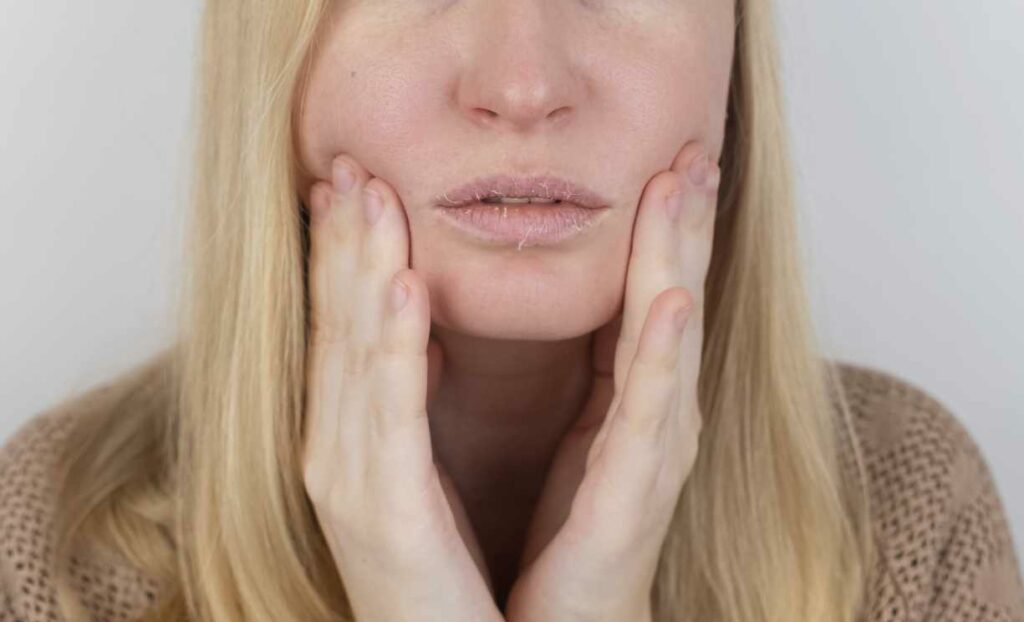Menopause is a transformative phase for women, but it can also bring about changes in the skin, including the delicate skin on the lips. Dry and chapped lips become a common concern during this time, affecting both comfort and confidence. Let’s explore the reasons behind dry lips during menopause and discover effective treatment for dry lips during menopause to keep your lips supple and hydrated.
Contents
Why Does Menopause Cause Dry Lips?
Menopause can cause dry lips due to hormonal changes that impact the body’s ability to retain moisture. Estrogen, a hormone that plays a crucial role in maintaining skin elasticity and hydration, decreases during menopause. As a result, the skin, including the delicate skin on the lips, may become more prone to dryness and dehydration.
Additionally, reduced collagen production, another effect of declining estrogen levels, can contribute to a loss of lip suppleness. External factors like exposure to the sun, cold weather, and certain medications taken during menopause can further exacerbate dryness. It’s essential to adopt hydrating measures, both internally and externally, to address this common symptom and keep the lips moisturized and comfortable during the menopausal transition.
Treatment For Dry Lips Due To Menopause
Dry lips can be a common and uncomfortable symptom, but with an effective treatment dry lips during menopause can be restored. Whether it’s caused by weather conditions, dehydration, or hormonal changes, these remedies can provide relief.
- Water Intake: Ensure you’re drinking an adequate amount of water throughout the day to maintain overall hydration, benefiting your lips from the inside out.
- Lip Balm with SPF: Invest in a good-quality lip balm with SPF to shield your lips from the sun’s harmful rays, especially if you spend time outdoors.
- Moisturizing Lip Products: Opt for lipsticks, glosses, and liners with hydrating ingredients like hyaluronic acid, shea butter, or coconut oil.
- Nighttime Lip Care: Apply a rich, nourishing lip balm or treatment before bedtime to provide intensive moisture as you sleep.
- Gentle Exfoliation: Use a mild lip scrub to exfoliate dead skin cells, promoting a smoother surface for better absorption of lip balms.
- Humidifier Usage: Place a humidifier in your bedroom to add moisture to the air, preventing your lips from drying out while you sleep.
- Omega-3 Fatty Acids: Include foods rich in omega-3 fatty acids, such as flaxseeds and fatty fish, in your diet to support skin health, including your lips.
- Avoid Licking Your Lips: Resist the urge to lick your lips, as saliva can contribute to dryness. Opt for lip balm instead to keep them moisturized.
- Consult a Dermatologist: If dryness persists, seek advice from a dermatologist. They can recommend specific treatments or prescribe medicated lip balms tailored to your needs.
Other Mouth Problems Related To Menopause
Menopause often brings about hormonal changes that can lead to dry mouth. The reduction in estrogen levels may result in decreased saliva production, causing discomfort, difficulty swallowing, and an increased risk of dental problems.
- Gingivitis and Gum Disease: Hormonal fluctuations during menopause can make the gums more sensitive to irritants, potentially leading to inflammation and gingivitis. Symptoms may include swollen, red, and bleeding gums, and if left untreated, it can progress to gum disease.
- Burning Mouth Syndrome: While the exact cause is unclear, hormonal changes during menopause may contribute to burning mouth syndrome. This condition manifests as a burning or tingling sensation on the tongue or throughout the mouth.
- Changes in Taste: Menopause can alter taste buds and the perception of taste. Women may experience a metallic or bitter taste and changes in sensitivity to certain flavors.
- Osteoporosis and Jawbone Health: Reduced estrogen levels can contribute to bone density loss, potentially affecting the jawbone. This may increase the risk of jawbone issues and tooth loss.
- Candidiasis (Yeast Infections): Hormonal changes and a drier mouth environment during menopause may create conditions favorable for yeast overgrowth, leading to candidiasis. Symptoms include white patches on the tongue and inner cheeks.
- Tooth Decay: Dry mouth, changes in saliva composition, and hormonal shifts can increase vulnerability to tooth decay. Common symptoms include the development of cavities and tooth sensitivity.
Management and Prevention
Effective management and prevention strategies are crucial for maintaining optimal oral health during menopause. Here are key measures to address and mitigate potential issues:
- Good Oral Hygiene Practices: Adopt and maintain a robust oral hygiene routine. Brush your teeth twice a day using fluoride toothpaste, and don’t forget to floss daily. Regular brushing and flossing help prevent gingivitis and reduce the risk of gum disease.
- Sugar Moderation: Limit the consumption of sugary foods and beverages. Excessive sugar intake can contribute to tooth decay, and moderation is key to maintaining oral health.
- Calcium-Rich Diet: Incorporate a diet rich in calcium and vitamin D to support bone health, including the jawbone. Dairy products, leafy greens, and fortified foods are excellent sources of these nutrients.
- Regular Dental Check-ups: Schedule regular dental check-ups and cleanings. Professional dental care is essential for early detection and management of any oral health issues. Your dentist can provide personalized advice based on your specific needs.
- Hormone Replacement Therapy (HRT): Discuss the potential benefits of hormone replacement therapy (HRT) with your healthcare provider. In certain cases, HRT may be recommended to address hormonal imbalances that impact oral health.
- Oral Moisturizers: Use oral moisturizers such as sugar-free gums or lozenges. These products can stimulate saliva production, helping to alleviate dry mouth symptoms.
- Address Stress: Practice stress management techniques. Stress can exacerbate oral health issues, so incorporating stress-reducing activities such as meditation or yoga can contribute to overall well-being.
Conclusion
In the journey through menopause, the often-overlooked challenge of dry lips deserves its due attention. This natural part of the aging process, influenced by hormonal changes, can be effectively managed with the right approach. By understanding the root causes, embracing a holistic treatment strategy, and incorporating simple yet powerful remedies into your daily routine, you can reclaim the softness and comfort of your lips.
As you navigate the transformative phase of menopause, remember that addressing dry lips is not merely a cosmetic concern but an essential aspect of your comfort and confidence. By nurturing your lips with care and embracing a comprehensive treatment approach, you can ensure that they remain a soft and supple reflection of your vibrant self.




